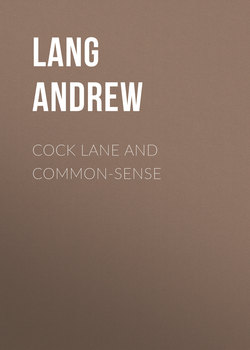Cock Lane and Common-Sense

Реклама. ООО «ЛитРес», ИНН: 7719571260.
Оглавление
Lang Andrew. Cock Lane and Common-Sense
TO JAMES PAYN, Esq
PREFACE
INTRODUCTION
SAVAGE SPIRITUALISM
ANCIENT SPIRITUALISM
COMPARATIVE PSYCHICAL RESEARCH
HAUNTED HOUSES
COCK LANE AND COMMON-SENSE
APPARITIONS, GHOSTS, AND HALLUCINATIONS
SCRYING OR CRYSTAL-GAZING
THE SECOND SIGHT
GHOSTS BEFORE THE LAW
A MODERN TRIAL FOR WITCHCRAFT
PRESBYTERIAN GHOST HUNTERS
THE LOGIC OF TABLE-TURNING
THE GHOST THEORY OF THE ORIGIN OF RELIGION
Отрывок из книги
On the other side, the Society for Psychical Research, while anxiously examining all the modern instances which Folklore rejects, has hitherto neglected, on the whole, that evidence from history, tradition, savage superstition, saintly legend, and so forth, which Folklore deigns to regard with interest. The neglect is not universal, and the historical aspect of these beliefs has been dealt with by Mr. Gurney (on Witchcraft), by Mr. Myers (on the Classical Oracles), and by Miss X. (on Crystal-Gazing). Still, the savage and traditional evidence is nearly as much eschewed by psychical research, as the living and contemporary evidence is by Folklore. The truth is that anthropology and Folklore have a ready-made theory as to the savage and illusory origin of all belief in the spiritual, from ghosts to God. The reported occurrence, therefore, of phenomena which suggest the possible existence of causes of belief not accepted by anthropology, is a distasteful thing, and is avoided. On the other hand, psychical research averts its gaze, as a rule, from tradition, because the testimony of tradition is not ‘evidential,’ not at first hand.
He would add one obvious yet neglected truth. If a ‘ghost-story’ be found to contain some slight discrepancy between the narratives of two witnesses, it is at once rejected, both by science and common-sense, as obviously and necessarily and essentially false. Yet no story of the most normal incident in daily life, can well be told without some discrepancies in the relations of witnesses. None the less such stories are accepted even by juries and judges. We cannot expect human testimony suddenly to become impeccable and infallible in all details, just because a ‘ghost’ is concerned. Nor is it logical to demand here a degree of congruity in testimony, which daily experience of human evidence proves to be impossible, even in ordinary matters.
.....
However, Professor Huxley lost nothing by not joining the committee of the Dialectical Society. Mr. G. H. Lewes, for his part, hoped that with Mr. Alfred Russel Wallace to aid (for he joined the committee) and with Mr. Crookes (who apparently did not) ‘we have a right to expect some definite result’. Any expectation of that kind was doomed to disappointment. In Mr. Lewes’s own experience, which was large, ‘the means have always been proved to be either deliberate imposture.. or the well-known effects of expectant attention’. That is, when Lord Adare, the Master of Lindsay, and a cloud of other witnesses, thought they saw heavy bodies moving about of their own free will, either somebody cheated, or the spectators beheld what they did behold, because they expected to do so, even when, like M. Alphonse Karr, and Mr. Hamilton Aide, they expected nothing of the kind. This would be Mr. Lewes’s natural explanation of the circumstances, suggested by his own large experience.
The results of the Dialectical Society’s inquiry were somewhat comic. The committee reported that marvels were alleged, by the experimental subcommittees, to have occurred. Sub-committee No. 1 averred that ‘motion may be produced in solid bodies without material contact, by some hitherto unrecognised force’. Sub-committees 2 and 3 had many communications with mysterious intelligences to vouch for, and much erratic behaviour on the part of tables to record. No. 4 had nothing to report at all, and No. 5 which sat four times with Home had mere trifles of raps. Home was ill, and the séances were given up.
.....